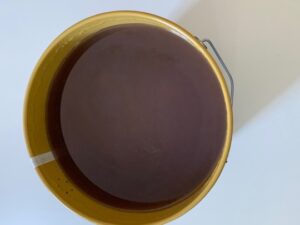Polyester Resin is a synthetic resin that is made from polyethylene terephthalate (PET) and glycols. Polyester resins are used in many industries because they have properties that make them more desirable than other types of resins.
What Is Polyester Resin
Polyester resin is a synthetic resin that is made from polyesters and aromatic hydrocarbons. In the process, the polyesters undergo a radical polymerization with an organic peroxide, or else they are reacted with an organic hydroperoxide.
This is to produce a thermosetting plastic that exhibits excellent aging and weathering resistance. Polyester resin is used to make a wide variety of products, such as boats, automobile parts, and furniture. It can also be used in the production of fiberglass, which is why it is often called fiberglass resin.
In comparison to other types of resins, polyester resin is relatively easy and inexpensive to produce. It also has a relatively low shrinkage rate, which makes it ideal for use in fiberglass applications. However, it is not as strong as some other types of resins and is more prone to moisture absorption.
Polyester resin is available in both liquid and solid forms. The liquid form is often used for small-scale projects, while the solid form is more commonly used for larger projects.
The Benefits of Polyester Resin
There are a number of benefits that can be attributed to polyester resin. These benefits include:
- Excellent weathering and aging resistance
- Low shrinkage rate
- Easy and inexpensive to produce
- Can be used in a variety of applications
- Low moisture absorption
Polyester Resin Uses And Applications
Polyester resin is a synthetic resin that can be used in a variety of applications, including fiberglass, boatbuilding, and surfboards. It is also used in windsurfing boards, car bodies, and other applications. Polyester resin can also be used as a coating to protect metal surfaces from corrosion.
Fiberglass
Polyester resin is often used in fiberglass applications because it can be combined with glass fibers to create a strong and durable material. This makes it a popular choice for boatbuilding, automotive manufacturing, and other applications. Polyester resin is also resistant to corrosion, making it a good choice for products that are exposed to the elements.
Boatbuilding
Polyester resin is often used in boatbuilding because it is a durable material that can withstand the elements. It is also relatively easy to work with, which makes it a popular choice for boatbuilders. Polyester resin can be used to create a variety of different boat types, including canoes, kayaks, and sailboats.
Windsurfing Boards
Polyester resin is also often used in windsurfing boards. This is because it is a lightweight material that can easily be shaped into the desired form. It is also resistant to corrosion, making it a good choice for boards that are exposed to the elements.
Car Bodies
Polyester resin can also be used in the manufacture of car bodies. This is because it is a durable material that can withstand the rigors of everyday use. It has good resistance to corrosion, making it an excellent choice for automobile bodies that are exposed to the weather.
Other Applications
Polyester resin can also be used in a variety of other applications, including construction, electrical insulation, and pipelining. It is also used in the manufacture of products such as wind turbines and water tanks. Polyester resin is a versatile material that can be used in a variety of applications.
How To Choose Between Liquid And Solid Resin
When choosing between liquid and solid polyester resin, there are a few factors to consider. The first is the size of the project. Liquid resin is often better for smaller projects, while the solid resin is better for larger projects. In general, the liquid resin can be used for projects up to about 25 square feet, while solid resin can be used for projects up to about 500 square feet
The second factor to consider is the level of expertise needed. Liquid resin is often easier to use than solid resin, so it may be a better choice for those who are new to polyester resin.
The third factor to consider is the level of shrinkage: liquid resin shrinks less than solid resin. This can be important for certain applications, such as boatbuilding, where it is important to have a material that does not shrink excessively.
Finally, the fourth factor to consider is the level of moisture absorption. Liquid resin absorbs less moisture than solid resin, so it may be a better choice for those who are concerned about that.
Polyester resin is a versatile material that can be used in many different applications. It is resistant to corrosion, making it suitable for outdoor use like boatbuilding and windsurfing boards. Polyester resin also shrinks less than solid polyurethane when heated, which means it may better suit certain projects such as boats or car bodies. Finally, liquid resin absorbs less moisture than solid resin, making it a good choice for those who are concerned about that attribute.
Shirley Mist has been involved in fashion and design for many years. She has also written extensively for many online publications. She currently writes for The Tribune World and is a valued member of our team.
